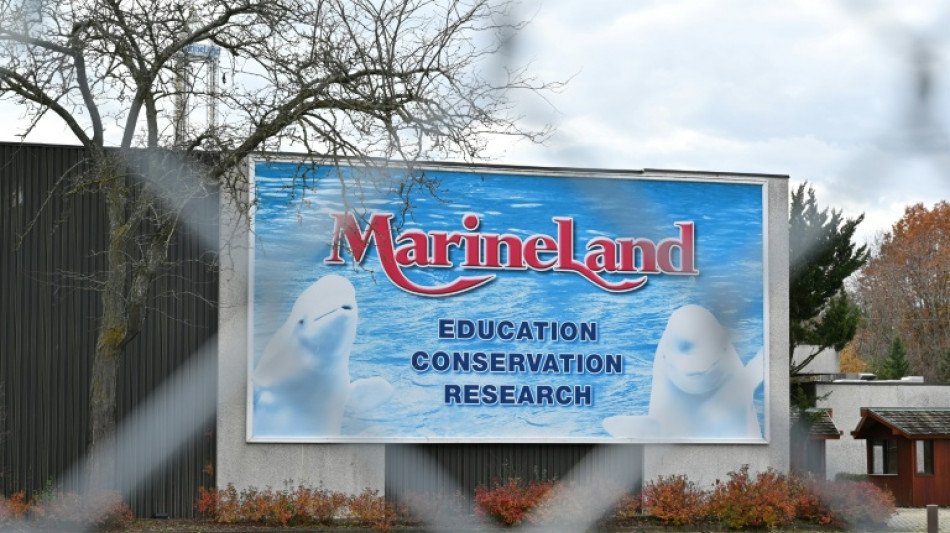

Canada's captive whales face euthanasia threat and uncertain future
The remaining 30 captive belugas at Canada's Marineland have nothing to do but wait.
The reportedly bankrupt former tourist attraction is closed to visitors, so the whales circle their decaying pools, while the park's owners -- who issued a shocking threat to euthanize the belugas -- spar with the government over what happens next.
Marineland, near the famed Niagara Falls, was once a profitable theme park. Its catchy jingle, which builds to the tagline "Everyone Loves Marineland," was a staple on Canadian television.
But the park has been mired in controversy for years, and its eerily empty walkways were visible from outside during a visit earlier this month.
Since 2019, 20 animals, including 19 belugas, have died at Marineland, according to a tally by the Canadian Press.
The park has said all the deaths were from natural causes, but animal welfare officials from the province of Ontario have been investigating Marineland for five years and concerns about the park's water system have persisted.
Having been raised in captivity, the whales likely would not survive in the wild.
Marineland thought it had a solution last month, when it announced plans to export the belugas to the Chimelong Ocean Kingdom theme park in China.
Canada's federal government blocked that idea, rejecting a solution it said perpetuated the whales' exploitation.
Escalating the saga, Marineland announced it was "fully indebted and rapidly running out of resources to provide adequate care for the whales."
"Our only options at this point are to either relocate the whales or face the devastating decision of euthanasia," a statement said.
Marineland has refused AFP's repeated requests for comment about the possible next steps.
- 'Heinous' -
Phil Demers, a former Marineland trainer turned whistleblower, has worked to document alleged abuses at the park.
The euthanasia threat is "not real," he told AFP.
"It's illegal. No one's going to ever participate in such a heinous thing," he said.
Demers insisted the park is solely motivated by profit, and wants to sell the whales.
Still, he said, Marineland's plan to move the belugas to another park, including possibly the one in China, was the only viable option.
"It's a question of where and when, not if," he said.
A main obstacle is Canada's 2019 "Ending the Captivity of Whales and Dolphins Act."
The legislation, which made it illegal to hold certain marine mammals in captive, prevented the government from approving Marineland's China export plan.
Marineland, like other similar parks, suffered falling revenues over broadening global resistance to attractions where captive mammals are trained to perform.
Demers stressed there aren't many facilities in the world that can accommodate multiple belugas, and the Chinese facility, which has spent massively on enormous tanks, could work.
"I think the minister made a mistake in rejecting the export permits, but time will tell," he said.
A spokesperson for Canada's fisheries minister, Joanne Thompson, told AFP "Canada is open to considering other transfers or export permits," and new proposals "will be reviewed expeditiously."
- 'I miss them so much' -
Kristy Burgess's first job at Marineland was as a waitress. After seeing a beluga being born, she studied and ultimately became a trainer at the park.
She told AFP that while the whales were living in an "abusive" environment -- with unclean facilities that are "falling apart" -- they are loved by the staff responsible for their care.
"There's a handful of whales, three in particular, that I constantly think about and wonder how they're doing," she said.
"Two of the other girls that I loved were really stubborn, but they were great for me," she added.
"I miss them so much."
Burgess stressed the belugas need a decent home and Marineland was clearly not a solution.
One option that has surfaced is a proposed whale sanctuary off Canada's Atlantic coast, in Nova Scotia province.
The project is under discussion and no construction has started, leading some to dismiss it as an option for Marineland's belugas.
The project's chief executive, Charles Vinick, said there needs to be a broader discussion about how to manage captive whales.
"The parks have a difficult situation, their revenue is going down because the public is changing... yet they own the animals," he said.
Marine mammals need options that "allow them to retire with grace, with dignity, and with an environment where they can thrive," he said.
L.Ferrari--GdR



